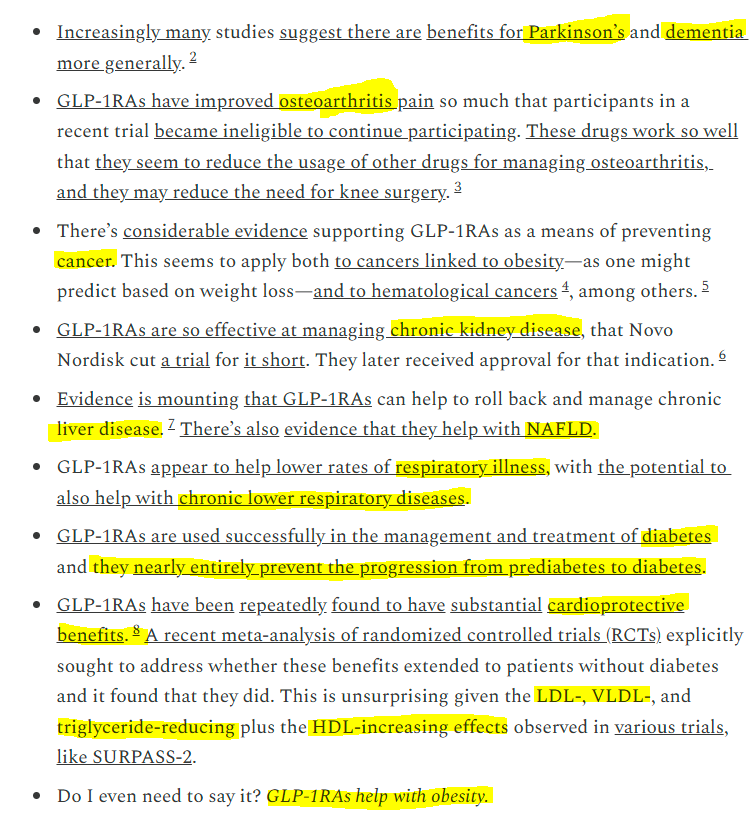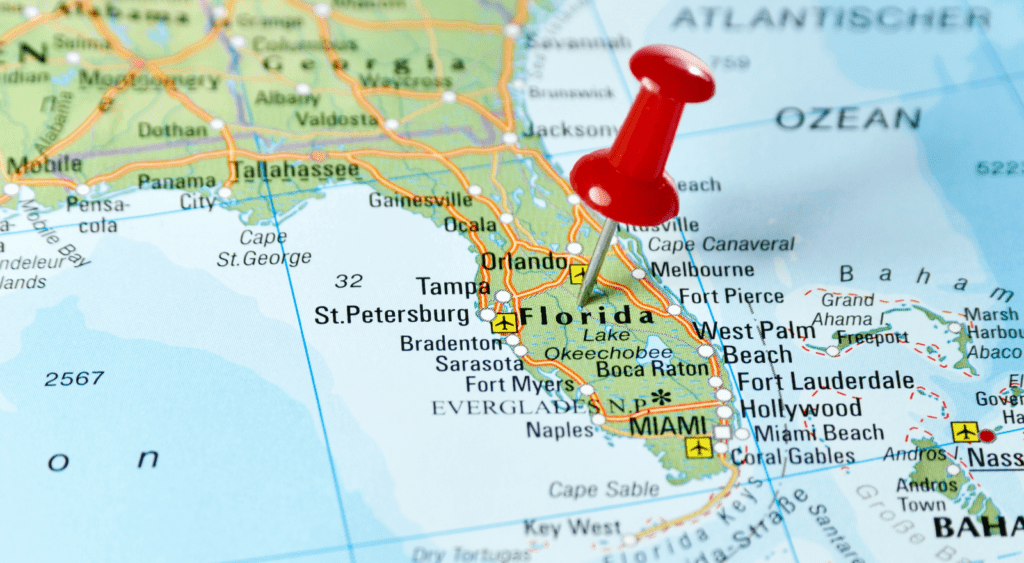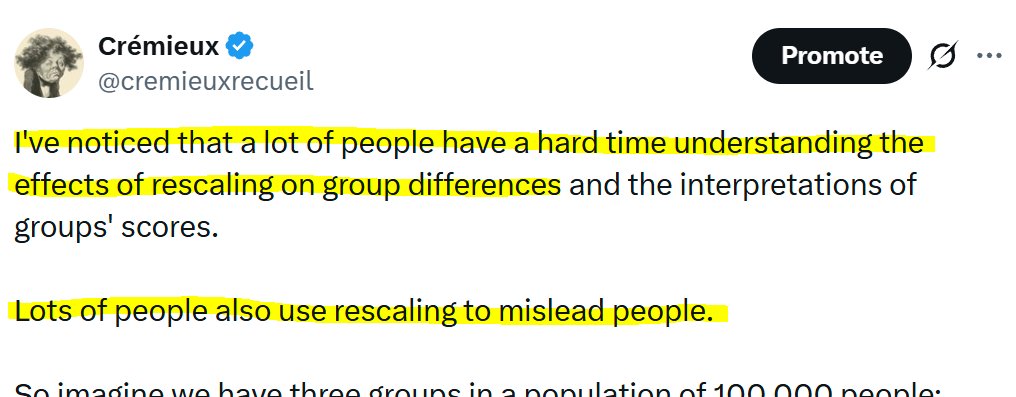Novo Nordisk failed to pay a small patent maintenance fee in Canada a few years ago.
As a result, a generic version of Ozempic will be available there soon.
The HHS can exploit this oversight to decisively end the chronic disease crisis, if it has the courage🧵
As a result, a generic version of Ozempic will be available there soon.
The HHS can exploit this oversight to decisively end the chronic disease crisis, if it has the courage🧵

First, a bit of background.
Novo Nordisk is a pharmaceutical company that makes drugs for diabetes.
The blockbuster drug that turned them into a major pharma player is semaglutide, which they sell under the brand names Wegovy, Ozempic, and Rybelsus.
Novo Nordisk is a pharmaceutical company that makes drugs for diabetes.
The blockbuster drug that turned them into a major pharma player is semaglutide, which they sell under the brand names Wegovy, Ozempic, and Rybelsus.

Semaglutide has been amazingly successful.
It greatly assists in the management of diabetes, and it causes major weight loss with minimal side effects for most.
Its utility for treating obesity is somewhere between an earlier daily version (liraglutide) and bariatric surgery.
It greatly assists in the management of diabetes, and it causes major weight loss with minimal side effects for most.
Its utility for treating obesity is somewhere between an earlier daily version (liraglutide) and bariatric surgery.

Given America's staggering obesity rate, it's no wonder that sales of the drug have been so incredible.
More importantly for America's health, these drugs seem to treat everything in the orbit of obesity, too.
More importantly for America's health, these drugs seem to treat everything in the orbit of obesity, too.

But these drugs are very expensive.
So expensive, in fact, that they don't currently pass a cost-benefit test.
But it doesn't have to be this way for long because Novo Nordisk slipped up.
They failed to keep their Canadian patent on file.
So expensive, in fact, that they don't currently pass a cost-benefit test.
But it doesn't have to be this way for long because Novo Nordisk slipped up.
They failed to keep their Canadian patent on file.

Why does this matter for the American HHS, you might ask?
Well, did you know that Floridians pay less for many drugs compared to the rest of the country?
Why, you ask? Because of a little-known and little-used FDA program.
Well, did you know that Floridians pay less for many drugs compared to the rest of the country?
Why, you ask? Because of a little-known and little-used FDA program.

The program is the Section 804 Importation Program.
This program allows states to import certain prescription drugs from Canada if the FDA determines those drugs are safe and will significantly reduce costs for consumers.
This program allows states to import certain prescription drugs from Canada if the FDA determines those drugs are safe and will significantly reduce costs for consumers.

Section 804 of the FD&C Act allows states to import drugs
- Regardless of U.S. patent status
- Regardless of whether there's a currently-approved U.S. generic
Since Canada gets a generic semaglutide next year, all it needs is FDA-approved labeling and it's good to go!
- Regardless of U.S. patent status
- Regardless of whether there's a currently-approved U.S. generic
Since Canada gets a generic semaglutide next year, all it needs is FDA-approved labeling and it's good to go!

If you're familiar with the generic semaglutide situation in the U.S., you may be confused:
Didn't Novo just win a case to keep its patent protection until 2033 because an approved American generic has to have the same delivery mechanism, which remains on patent?
Good point!
Didn't Novo just win a case to keep its patent protection until 2033 because an approved American generic has to have the same delivery mechanism, which remains on patent?
Good point!
It's true that when you want to file an ANDA to start selling a generic drug, the autoinjector patent is fatal.
But, Section 804 doesn't care.
A Canadian semaglutide qualifies for import if it's shipped in a non-infringing vial/cartridge and the drug is equivalent.
That's all!
But, Section 804 doesn't care.
A Canadian semaglutide qualifies for import if it's shipped in a non-infringing vial/cartridge and the drug is equivalent.
That's all!

But wait a second, isn't the dosage form the autoinjector?
No!
"Dosage form" has a specific referent. It refers to broad categories, whereas an autoinjector is a "device constituent part" of a "combination product"—it's irrelevant!
No!
"Dosage form" has a specific referent. It refers to broad categories, whereas an autoinjector is a "device constituent part" of a "combination product"—it's irrelevant!

Why even debate autoinjectors in the first place?
Because of "patent thickets".
Novo Nordisk and other pharmaceutical companies scam Americans by extending their patent protections using patents that are irrelevant to their drugs, but which the FDA is forced to consider.
Because of "patent thickets".
Novo Nordisk and other pharmaceutical companies scam Americans by extending their patent protections using patents that are irrelevant to their drugs, but which the FDA is forced to consider.

So what's eligible for import?
A 1mg/mL multi-dose vial meets the "solution-for-injection" dosage form requirement. No blockable issue.
An alternate pen design for subcutaneous injection would be handled swiftly under 21 CFR 4 after import. No blockable issue.
Or...
A 1mg/mL multi-dose vial meets the "solution-for-injection" dosage form requirement. No blockable issue.
An alternate pen design for subcutaneous injection would be handled swiftly under 21 CFR 4 after import. No blockable issue.
Or...
Canadian generic producers could just infringe the Novo patent
This is the most interesting possibility
If they make injection pens with Novo's patented spring mechanism, Novo can sue under 35 U.S.C. § 271, but the FDA won't block imports because patents go to court, not § 804
This is the most interesting possibility
If they make injection pens with Novo's patented spring mechanism, Novo can sue under 35 U.S.C. § 271, but the FDA won't block imports because patents go to court, not § 804
If they do this, then, well, they'd be doing a public service
Why? Because they'd give the FDA the incentive to clarify a strong position on patent thickets
Limit device patents that extend the dosage form, force brand name drug makers to certify devices meet listing criteria
Why? Because they'd give the FDA the incentive to clarify a strong position on patent thickets
Limit device patents that extend the dosage form, force brand name drug makers to certify devices meet listing criteria
Deny petitions "for the purpose of delaying" an ANDA under §505(q) authority, and require precise patent "use codes" to trim overly broad method claims blocking skinny-label generics.
After all of this, the FDA could petition the FTC with more junk cases and hit up Congress too.
After all of this, the FDA could petition the FTC with more junk cases and hit up Congress too.
The FDA is in a good position vis-à-vis big pharma right now
They could probably succeed if they ask Congress to remove the Hatch-Waxman automatic 30-month stay for patents or allow at risk approvals, give the FDA the power (or OBLIGATION!) to reject obvious non-drug patents...
They could probably succeed if they ask Congress to remove the Hatch-Waxman automatic 30-month stay for patents or allow at risk approvals, give the FDA the power (or OBLIGATION!) to reject obvious non-drug patents...
Or compel applying companies to forfeit exclusivity if first filer status delays marketing, while awarding exclusivity to the first entrant that launches.
All of this can be done now.
So what's the next step? How do we get a generic into American hands next year? EASY!
All of this can be done now.
So what's the next step? How do we get a generic into American hands next year? EASY!
The first thing for @RobertKennedyJr to do is to convene roundtables and demand HHS subagencies convene them too.
The FDA frequently does roundtables. For example, they just did a really great one on an amazing drug access model. It touched on reform priorities.
The FDA frequently does roundtables. For example, they just did a really great one on an amazing drug access model. It touched on reform priorities.

Roundtables allow for public-private engagement that's legal, precedented, and actionable.
CMMI does these with payers, providers, and manufacturers, BARDA does Industry Day, ASPR meets with industry, @DrMakaryFDA is going around meeting with CEOs right now!
CMMI does these with payers, providers, and manufacturers, BARDA does Industry Day, ASPR meets with industry, @DrMakaryFDA is going around meeting with CEOs right now!
What do we need in this roundtable?
Canadian manufacturers. They need to give the FDA launch and supply scale information and timelines. They need to understand the ANDA and 804 compliance paths. They need to be briefed on labeling and packaging.
Simple stuff, really.
Canadian manufacturers. They need to give the FDA launch and supply scale information and timelines. They need to understand the ANDA and 804 compliance paths. They need to be briefed on labeling and packaging.
Simple stuff, really.
These manufacturers also need to be brief on how they can coordinate with Medicaid CMOs, state health plans, and large employers.
Invite everyone!
Including CMMI for demos covering imports, and people proposing subscription/Netflix "all-you-can-treat" models.
Invite everyone!
Including CMMI for demos covering imports, and people proposing subscription/Netflix "all-you-can-treat" models.
But don't invite Novo Nordisk and Eli Lilly, as they want to ensure a generic doesn't hit the market.
They have a history of trying to block generics, and we want generics, because Americans deserve to pay less for drugs.

They have a history of trying to block generics, and we want generics, because Americans deserve to pay less for drugs.
https://x.com/cremieuxrecueil/status/1900230788844572755

Another roundtable needs to happen for states.
Each state needs to be invited to a SIP proposal that gets rapidly approved once eligible candidate drugs are out.
Do this right and @RobertKennedyJr could Make America Healthy within four years.
He'd be a legitimate hero.
Each state needs to be invited to a SIP proposal that gets rapidly approved once eligible candidate drugs are out.
Do this right and @RobertKennedyJr could Make America Healthy within four years.
He'd be a legitimate hero.
And he'd save literally trillions of dollars for America. But only if he has the will.
Sources:
i-mak.org/glp-1/
epicresearch.org/articles/patie…
science.org/content/blog-p…
fda.gov/about-fda/repo…
hhs.gov/sites/default/…
federalregister.gov/documents/2020…
fda.gov/industry/struc…
fortune.com/2024/01/31/lin…
h/t @calebwatney, whose post brought this to my attention: x.com/calebwatney/st…
P.S. Won't this kill innovation?
No. There's little reason to think this. It might even be good for innovation, since it'll discourage wasteful R&D spent on nonsense patents that merely contribute to thickets and it'll encourage companies to compete in product improvements more since they'll have less protection for early, 'baseline' styles of patents. It'll also open up other companies to compete on improvements to a product with the original drug and it'll allow cheaply doing combination drugs, of which there are currently many proposed candidates (like myostatin and activin A inhibitors).
See the directly relevant case of insulin!
Also: nber.org/papers/w33588 and x.com/TechCrunch/sta… as an example. And: census.gov/library/workin….
Plus, we should be doing trial reform and other things to encourage and lower the costs of innovation rather than merely submitting to a system that truly does maintain exploitatively high prices.
Sources:
i-mak.org/glp-1/
epicresearch.org/articles/patie…
science.org/content/blog-p…
fda.gov/about-fda/repo…
hhs.gov/sites/default/…
federalregister.gov/documents/2020…
fda.gov/industry/struc…
fortune.com/2024/01/31/lin…
h/t @calebwatney, whose post brought this to my attention: x.com/calebwatney/st…
P.S. Won't this kill innovation?
No. There's little reason to think this. It might even be good for innovation, since it'll discourage wasteful R&D spent on nonsense patents that merely contribute to thickets and it'll encourage companies to compete in product improvements more since they'll have less protection for early, 'baseline' styles of patents. It'll also open up other companies to compete on improvements to a product with the original drug and it'll allow cheaply doing combination drugs, of which there are currently many proposed candidates (like myostatin and activin A inhibitors).
See the directly relevant case of insulin!
Also: nber.org/papers/w33588 and x.com/TechCrunch/sta… as an example. And: census.gov/library/workin….
Plus, we should be doing trial reform and other things to encourage and lower the costs of innovation rather than merely submitting to a system that truly does maintain exploitatively high prices.
Clarification on Florida's SIP:
Their program is approved, but I actually don't know if they've imported anything under it yet.
When they do, they will then achieve sizable price reductions. Maybe they already have, but again, I don't have data on that.
Their program is approved, but I actually don't know if they've imported anything under it yet.
When they do, they will then achieve sizable price reductions. Maybe they already have, but again, I don't have data on that.
• • •
Missing some Tweet in this thread? You can try to
force a refresh
















